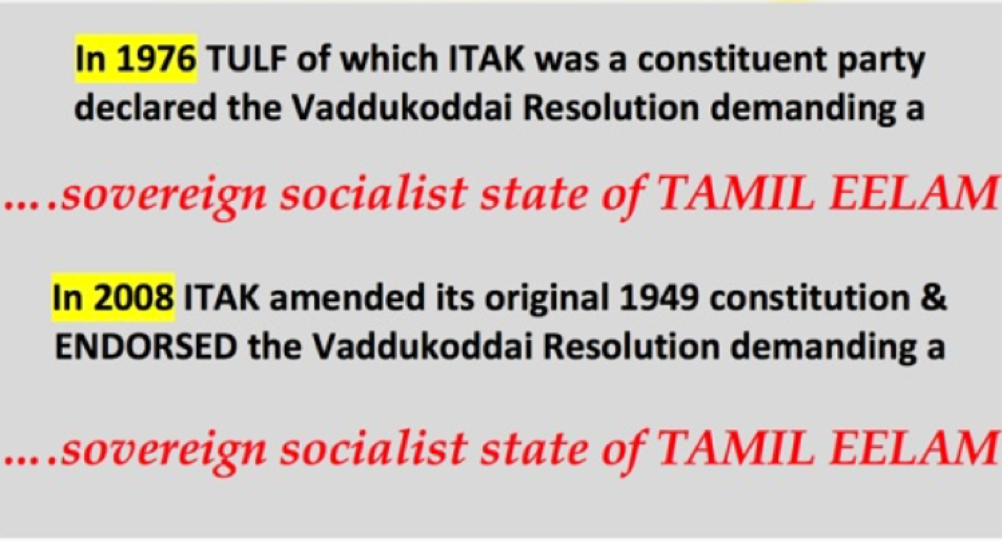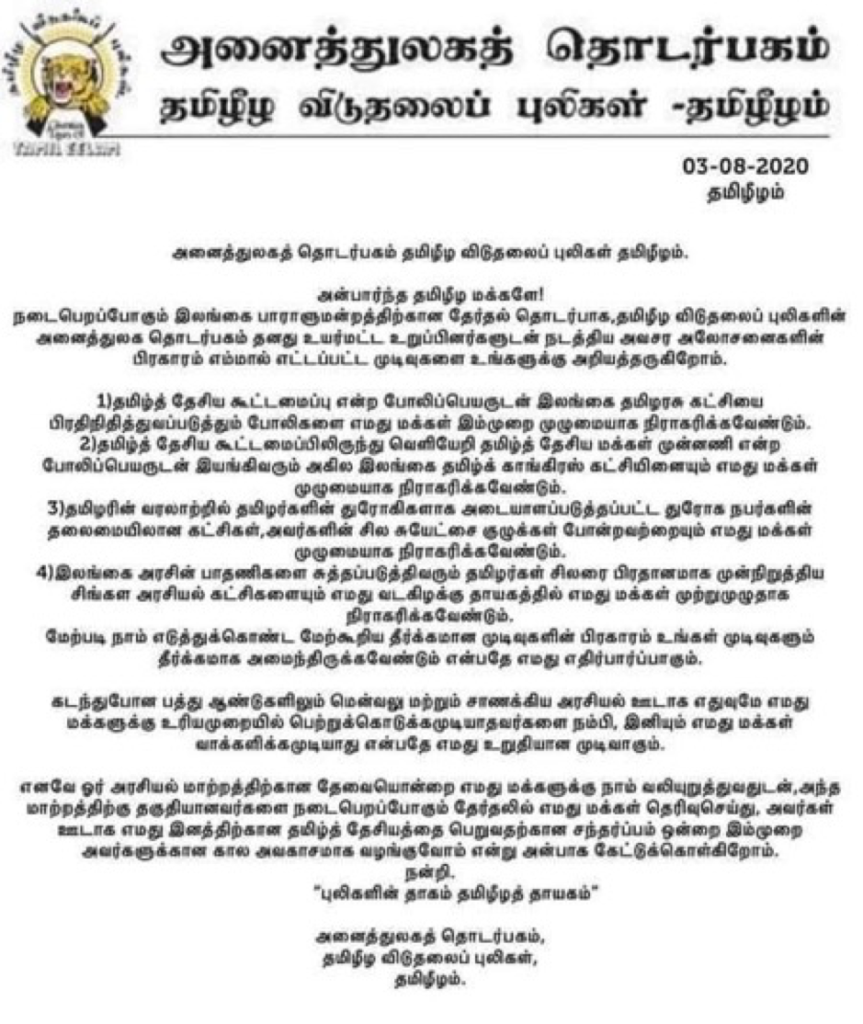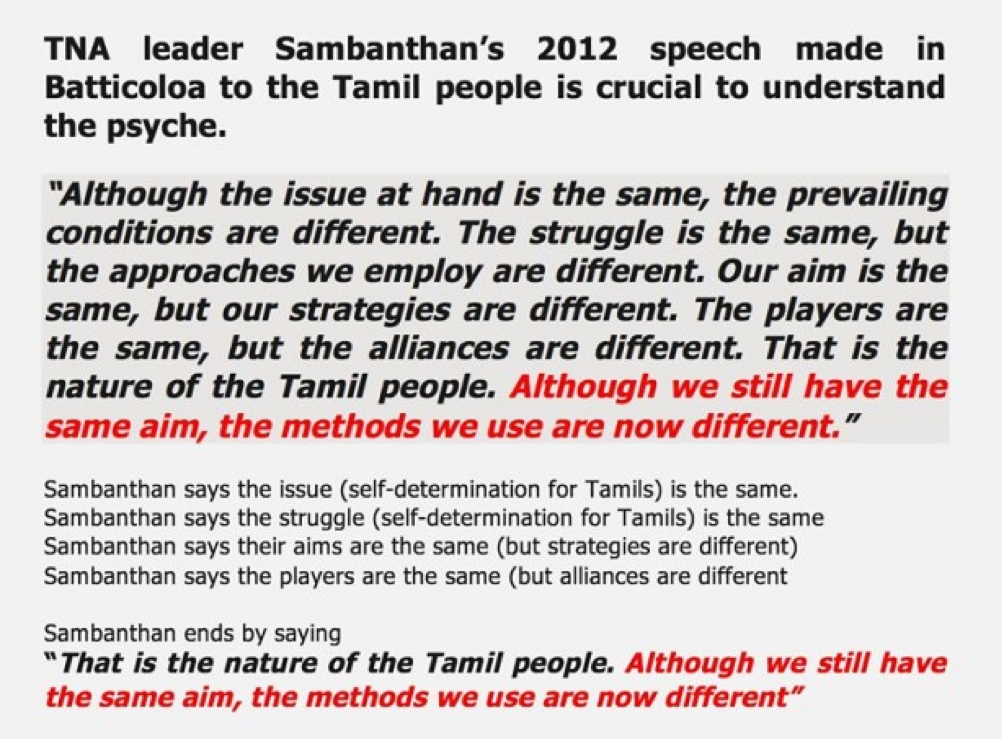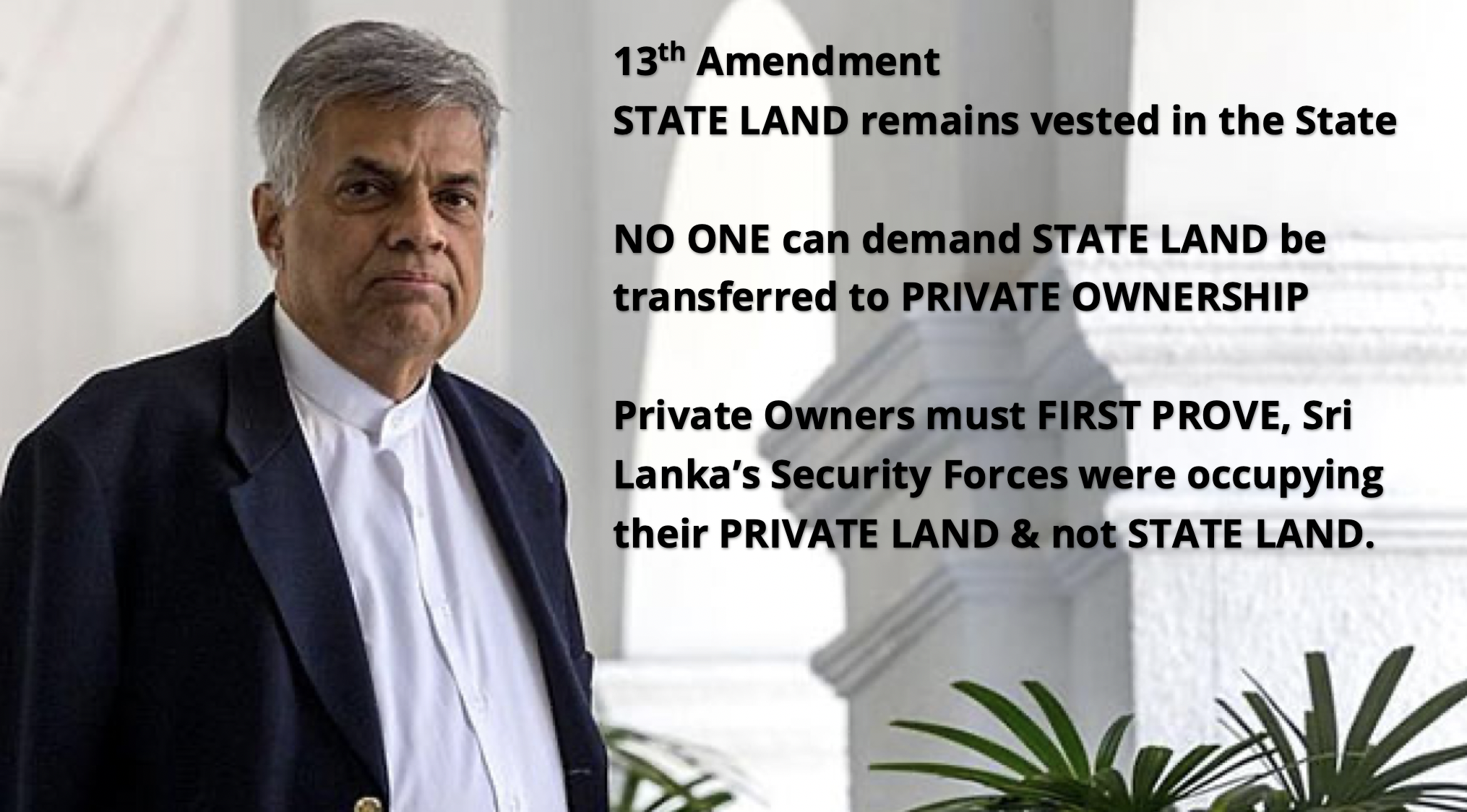චානක බණ්ඩාරගේ
සිංහලයා ක්ෂය වෙන ජාතියක්?
අද රටේ සිංහලයන් අතර කථිකාව ‘ශ්රී ලාංකික අනන්යතාවය’ තව තවත් ප්රවර්ධනය කල යුත්තේ කෙසේද යන්න මිස රටේ සිංහල ජනගහනය ක්ෂය වීම හෝ සිංහලයාට වන අසාධාරණකම් නොවේ. බෞද්ධ අයිතීන් ගැන නම් යම් කථිකාවක් ඇත.
ශ්රී ලංකාව දෙකඩ කිරීමේ ඊලාම් ඉල්ලීම අදද රටේ සහ ඉන් පිටත තදින්ම ක්රියාත්මක වන බව පිළිගැනීමට අප අකමැත්තක් දක්වමු. ඒ අපගේ මෝඩ කම විය හැකියි.
උතුරේ සාමාන්ය දෙමළ ජනයා ඉඩම්, පොලිස් බලතල නොඉල්වයි. සම්බන්ධන්, සුමන්තිරන්, ශ්රී ධරන්, සිවාජිලිංගම්, රාසමානික්කම්, විග්නේස්වරන්, පොන්නම්බලම් වැනි මහතුන් වෙනම දෙමළ රාජ්යක් ගැන දිගු කලක සිට සිහින මවන්නෝයි. මේ අයගේ මන දොළ (fantasy) පිනවීමට, අප රණ විරුවන් ජීවිත පරිත්යාගයෙන් රැක ගත් මේ රට, බන්දේසියක තබා ඒ අයට පුජා කල යුතුද?
වරක් උතුරේ හිටපු මහ ඇමතිව සිටී වර්ධරාජා පෙරුමාල් මහතා උතුරේ වෙනම රාජ්යක් ප්රකාශ කළේය.
මේවා දැන දැනත් ඉඩම්, පොලිස් බලතල දීමෙන් රට දෙකඩ වීමේ අවදානමක් නැති බව දියවන්නාවේ දේශපාලනඥයන් කියන්නේ ඇයි?
මුළු ලොවම තම ත්රස්තවාදී පනත් වැඩි දියුණු, ශක්තිමත් කරන මේ අවධියේදී අප අපට තිබෙන එකම පනතත් අහෝසි කල යුතුයයි කියා උද්ඝෝෂණය කරන්නෙමු. ත්රස්තවාදය යලි හිස ඔසවා දකුණේ බෝම්බ පිපිරෙන විට මැරෙන්නෙත් අපි බව මේ අයට නොතේරේද?
රටේ මිනිසුන්ට හරිහැටි එක වේලක්වත් කෑමට නොමැති මේ මොහොතේ ඒ පිළිබඳව සිය උපරිම කාලය සහ ශ්රමය වැය කරනු විනා හදිසියේම ඉඩම්, පොලිස් වැනි සියළු බලතල උතුරු නැගෙනහිරට ලබාදීමට දේශපාලකයෝ බලවත් සේ උත්සුක වීම කනගාටුදායක තත්ත්වයකි. මැතිවරණයක් ළඟ මානයේ නිසා මෙය ද්රවිඩ චන්ද ලබා ගැනීමේ ගුන්ඩුවක් බව පාසැල් යන දරුවා පවා දනී. මෙය හුදු, TNA සහාය තමන්ගේ පැත්තට හරවා ගැනීමට තැත් කිරීමකි.
මේවා දුන්නාය කියා විශාල වශයෙන් නව ද්රවිඩ චන්ද ඔවුනට නොලැබුණු ඇත, නමුත් සිංහල දේශපාලනඥයෝ මෙවැනි ව්යාජ බලාපොරොත්තු තබාගෙන සිටීමට රුසියෝය.
පාර්ලිමෙන්තුවේ සිංහල විපක්ෂයෙන් මේ ගැන විමසන විට ඔවුන් දෙන උත්තරය වනුයේ ‘Yes, we are for full devolution’ යන්නයි.
ඉතා නුදුරේම ඉඩම්, පොලිස් බලතල ලබාදීමට යාම පිළිබඳව, පාර්ලිමේන්තුවේ ප්රධානතම සිංහල මාක්ස්වාදී පක්ෂය (3%), තම ස්ථාවරය ප්රකාශ කල යුතුය. ජනතාවට මෙය ඔවුන්ගෙන් දැන ගැනීම ඉතා වැදගත්ය. ඔවුන් දැනට ‘මුහුණ වැලි ගොඩේ හංගා ගෙන’ සිටිත්. ජාතික ප්රශ්නයකදී එසේ සිටිය නොහැක.
අද ඉඩම්, පොලිස් බලතල බෙදීමට පක්ෂව කථා කරන, දේශපාලනයෙන් සමු ගැනීමට ආසන්න අවධියේ සිටින බොහෝ දේශපාලනඥයන්, තමන්ගේ හුදු දේශපාලන පැවැත්ම උදෙසා නැතිකරන්න යන්නේ දැනට ඉපදුනු සහ ඉපදීමට සිටින සිංහල දරුවන්ගේ අනාගතයයි. දියේ ගිලෙන්න යන්නා තුත්තිරි ගසේ හෝ එල්ලෙයි.
දැන් මේ අනවශ්ය කරුණක් එකෙනෙහිම ඉස්මතු කිරීම නිසා නැති සිංහල, දෙමළ අසමගියක් රටේ ඇතිවිය හැක. තමන්ගේ හුදු පුද්ගලික වාසිය තකා ජනතාව බෙදීම දේශපාලනඥයන් විසින් නොකළ යුත්තකි.
ශ්රී ලංකාවේ සිංහල ප්රතිශතය අඩු වීම ගැන ගරු සංඝයාවහන්සේලාද කථා කරනවා මදිය. ඇතැම්හු තවමත් රටේ සිංහල ප්රතිශතය 70% යන ව්යාජ මතයේ එල්බ සිටිත්. මෙයින් පරිහානයට පත් වන්නේ සිංහල ජාතියය.
ව්යාජ සංඛ්යාලේඛන ඉදිරිපත් කිරීමට රජයන් ඉතා දක්ෂය. ඒවා ඒ අයුරින්ම පිළිගැනීමට අපද සැදී පැහැදී සිටිමු.
රටේ 2000ක් පමණ හෝ ඊට අඩුවෙන් අලි සිටින අවස්ථාවක, ඒ සංඛ්යාවද සීග්රයෙන් පහත බසින විට, එවක පැවතී රජය කලේ හොර අලි සංගණනයක් පවත්වා රටේ අලි 5000ක් සිටිනවා යන බොරු සංඛ්යාලේඛන ඉදිරිපත් කිරීමය. එකම අලියා දෙතුන් වතාවක් ගැන්න බව එක් පරිසරවෙදියෙක් මෙම ලියුම්කරු සමඟ පැවසීය.
1948 සුද්දා යනවිට රටේ වන ගහණය මුළු බිමෙන් 49% විය (ඔවුන් විසින් ඉතා වටිනා කඳුරට වර්ෂා වනාන්තර (සිංහරාජය වැනි), කපා දමා ඒවායේ තේ වැනි වැවිලි බෝග සිටවන ලදී). යාල, විල්පත්තු අභය භුමි තුලට පවා, ඒවායේ මායිම් අසළ, මිනිස් නිවාස ඉදිවී තිබෙනු දක්නට ලැබේ. අති සුඛෝපභෝගී හෝටල මේ අභය භුමි තුල ඉදි කර තිබේ. මේවා ඉදිරියට තවත් ඉදිවෙනු ඇත. අහිංසක වන ජීවීන්ට කවදා හෝ සිදු වනුයේ මෙම හෝටල්වලින් ඉඳුල් ඉල්ලා කෑමය.
අද රටේ නියම වන ඝණත්වය 12%ක් වත් වේද?
කඩිනම් මහවැලි සංවර්ධන වැඩපිළිවෙල යටතේ මහියංගනය, නොච්චියාගම, සෙවණගල, මොරගහකන්ද වැනි ප්රදේශ සහ ඒ අවට අක්කර ලක්ෂ ගණනින් වන ගහණය අහිමි කරගතිමු. 1980 පමණ පැල්වත්ත සිනී යයි කියා අම්පාරේ වනාන්තර අක්කර දහස් ගණනක් නැති කර ගතිමු. එදායින් ඇරභී හෝ වැඩි දියුණු වූ මහා අලි – මිනිස් ගැටුම අදත් තදින්ම ක්රියාත්මකයි. රටේ අසාර්ථක භාවයට හොඳම නිදසුනකි මෙය. දක්ෂ, දුරදර්ශී නායකයෙක් සිටියේ නම් මේ ප්රශ්ණය විසඳා බොහෝ කල්ය.
මේවා විසඳිය හැකි ප්රශ්ණය. ප්රශ්ණය නම් හොරා කෑම, තම ‘ගොඩ’ වැඩි කරගන්නේ කෙසේද, තනතුරු වලට නුසුදුසු පවුලේ ඥාතින්, යහළුවන්ට රජයේ තනතුරු ලබා දෙන්නේ කෙසේද, ලිංගික විෂමාචාර, කොමිස් ගැසීම වැනි දේ ගැන ප්රමුඛත්වය දී වැඩ කරන දේශපාලුවන්ට මේවා රටේ බරපතල ප්රශ්ණ ලෙස නොපෙන්.
සිංහලයා ක්රමයෙන් සංඛ්යාවෙන් අඩුවී යන ජාතියක් බවත් සිංහල භාෂාව ක්ෂය වෙන භාෂාවක් බවත් රහසක් නොවේ. මහනගරවල දැනටමත් සිංහල ජන සංඛ්යාව සීග්රව අඩුව ඇත. මේවා ක්රමානුකුලව පළාත්, නගර, ප්රාදේශීය සභා ප්රදේශවලද සිදුවනු ඇත.
1980 මුල් භාගයේදී බම්බලපිටිය මහල් නිවාස (Bambalapitiya Flats) වල සිංහල ප්රතිශතය 80% එහා විය. අද එහි ද්රවිඩ ප්රතිශතය 80% එහාවී ඇත. කොළඹ සිංහලයාට අත්වී ඇති ඉරණම ගැන මෙයටත් වඩා හොඳ උදාහරණයක් තවත් අවශ්යද?
කොළඹ මහ නගර සභා සීමාව තුල අද සිංහල, දෙමළ, මුස්ලිම් සම සමව වාගේ වෙත් (1/3 බැගින්). 1980 මුල් කාලයේදී මෙය සිංහල 70%ක් පමණ විය.
සිංහල පරිහානිය ගැන සුළු ජාතීනට දොස් කීමෙන් පලක් නැත. තමන්ගේ ජාතිය වැඩි කර ගැනීමට ඔවුන් කටයුතු කිරීම ඔවුන්ගේ වරදක් නොවේ. සිංහලයෝ සෙල්ලක්කාරයන් මෙන් ජීවත් වෙති. ඔවුනට සිය ජාතිය, බුද්ධාගම ගැන, ඒවා ආරක්ෂා කර, ප්රවර්ධනය කිරීම ගැන දැඩි හැගීමක් නැත. අප සියල්ල ‘ශ්රී ලාංකිකයෝ’ යයි ඔවුහු කියති. ඒ වෙනුවෙන් සිංහලත්වය, බෞද්ධත්වය යට යන බව ඔවුනට නොවැටහේ. එසේ වැටහුනත් ඔවුනට ගානක් නැත.
2000 පමණ වන තෙක් ශ්රී ලංකාව දැඩි බහු සංස්කෘතික රටක් විය, එනම්, සියළු ජාතීන් තම තමන්ට ආවේනික වූ සංස්කෘතීන් තුල ජීවත්වෙමින්, ශ්රී ලාංකික පුරවැසියන් ලෙස කටයුතු කළහ. 1990 ගණන්වල මැද භාගයේ හඳුන්වා දුන් සංහිඳියා වැඩ සටහනින් වුයේ දකුණේ සිංහලයන් තම සිංහල බෞද්ධත්වය – සිංහල සංස්කෘතිය පසෙකලා ශ්රී ලාංකික අනන්යතාවය – ශ්රී ලාංකික සංස්කෘතියක් වැලඳගැනීම වෙනුවෙන් කැපවී වැඩ කිරීමයි.
සංහිඳියාවේ මුළිකම ඉලක්කය වුයේ සිංහලයායි. සිහලයා වැරදි යයි, ඔවුන් වෙනස් විය යුතු යයි උදේ සවස මන්ත්රයක් මෙන් මතුරන ලදී. මේවා රජයන් විසින් සිතා මතා කරන ලද දේය.
බොහෝ දෙනෙක් දෙමළ ඉගෙන ගත්හ. කෝවිල් ගියහ, සිංහල පසෙක ලා දෙමළ චිත්රපටි, සින්දු රස විඳින්නට වඩාත් යොමු වූහ. දෙමළ ක්රමයට ඇඳුම් (සරම්, සාරි, පොට්ටු, කරාබු) ඇන්ඳහ/පැලඳූහ, දෙමළ/මුස්ලිම් කෑම සෑදීමට/අනුභවයට, උඩරට නැටුම් වෙනුවට දෙමළ නෘත්යයන් ඉගෙනුමට වඩාත් යොමු වූහ. දෙමළ/ මුස්ලිම් අය තම සමීප මිතුරන්/අසල්වැසියන් බවට පත් කර ගත්හ. තම විවාහ සහකරු/සහකාරිය ලෙස පෙර නොවූ විරූ ලෙස සිංහල නොවන ද්රවිඩ/ මුස්ලිම් අයව තෝරා ගත්හ.
මේ දේවල් විවේචනය කරනවා නොවේ.
දකුණේ සිංහලයෝ තමනට ‘ශ්රී ලාංකික සංස්කෘතිය’ ආරෝපණය කර ගැනීම උදෙසා ද්රවිඩ/මුස්ලිම් සංස්කෘතින් හා සමීප වීමට බලවත් ලෙස උත්සාහ කරද්දී, උතුරේ හා නැගෙනහිර අය (දෙමළ, මුස්ලිම් – විශේෂයෙන්ම උතුරේ දෙමළ) සිංහල කථා කිරීම, බෞද්ධාගම, සිංහල සිරිත් විරිත් ඉගෙනුම ගැන සුවිශේෂ උනන්දුවක් දැක්වූ බවක් අසන්නට නොලැබුණි.
සංහිඳියා ක්රියාදාමයේදී, ජනවාර්ගික ප්රශ්ණයේ සියළු වැරදි සිංහලයන් තුල පැටවුවා වැනි පණිවුඩ නිරන්තරයෙන් නිකුත් කෙරිණි.
සිංහලයෝ සිංහල, බෞද්ධත්යෙන් මිදී ‘ශ්රී ලාංකිකයන්’ බවට පත්වීම ඉතා සාර්ථකව සිදුවී ඇත; තවදුරටත් එය සීග්රයෙන් සිදු වෙමින් පවතී.
මේ නිසා, 1990 පසු කිසිම ජාතිභේදයක් නැති දරුවන් දකුණෙන් බිහි වුණි. මෙය හොඳ දෙයකි.
නමුත්, උතුරේ සහ නැගෙනහිර සංහිඳියා යාන්ත්රණය දකුණේ මෙන් උග්රව ක්රියාකෙරුනේ නැත; ජාතිවාදය ඒ ප්රදේශවල, විශේෂයෙන්ම උතුරේ, අදත් තදින් ඇත. රජයන් මේ ප්රදේශවල සංහිඳියා යාන්ත්රණය උවමනාවෙන්ම දැඩි ලෙස ප්රචලිත නොකරන ලදී.
‘ශ්රී ලාංකිකයන්’ බවට පත්වීම සඳහා උතුරේ සහ නැගෙනහිර වැසියන් තම දෙමළ සහ මුස්ලිම් සංස්කෘතීන් ‘පාවා’ දුන්නේ නැත. ඔවුන් තම ද්රවිඩත්වය, මුස්ලිම්භාවය තව තවත් තීව්ර කරගත්හ. ඒ සඳහා ඔවුන්ගේ දේශපාලනඥයෝ ඔවුනට අනුබලය/සහාය දුන්හ.
ශ්රී ලංකාවෙන් සිංහලයා සදහටම වඳවී නොයනුඇත. නමුත්, ශ්රී ලංකාව තුල සිංහලයා සුළු ජාතිකයෙක් ලෙස ඉදිරි දවසක ජිවත් වීම නියත වනු ඇත (30% – 35% ක පමණ ලෙස). එදාට මෙය කියවන ඔබ – මෙම ලියුම්කරු – වර්තමානයේ බොහෝ මැදි වියේ/වැඩිමහළු අයවලුන්, දිවි මඟ හැර ගොසිනි.
දැනට සිදුවෙමින් පවතින මහා පරිමාණ ක්රිස්තියානිකරණයත් (සිංහල බෞද්ධයන් ක්රිස්තියානි වීම), හින්දු, මුස්ලිම් ජනගහනවල සීග්ර වර්ධනය, රටේ චීන ජනපද ඇති වීම, වෙනත් නොයෙක් විදේශිකයන් මෙහි නීති විරෝධී ලෙස ජීවත්වීම ආදිය සමඟ තවත් අවුරුදු 75 කින් එහා, වර්ෂ 2100දී, මේ රටේ මුළු සිංහල බෞද්ධ ජනගහනය 20% – 25% පමණ වනු ඇතැයි යන මෙම ප්රකාශය ගැන ඔබ පුදුම නොවිය යුතුය.
අපගේ අනාගත සිංහල පරම්පරාව ගැන සිතන විට ඉමහත් ශෝකයක් දැනේ.
සම්ප්රදායනුකුලව, සිංහල කාන්තාවක් ද්රවිඩ/මුස්ලිම් පුද්ගලයෙක්ව බැන්ඳහොත් ලැබෙන දරුවන් දෙමළය/මුස්ලිමය. එසේම, සිංහල පිරිමියෙක් ද්රවිඩ/මුස්ලිම් කාන්තාවක් බැන්ඳහොත් ලැබෙන දරුවන් සිංහලය. උතුරේ සහ නැගෙනහිර මේ අවුල නොමැත්තේ මිශ්ර විවාහයන් එම ප්රදේශවල ඉතාම හිඟ නිසාය. ස්වකීය ජාතියේ ‘පාරිශුද්ධ බව’ ආරක්ෂා කර ගැනීමට ඔවුහු දිවි හිමියෙන් කැප වී වැඩ කරති. අමිශ්ර දෙමළ, මුස්ලිම් දරුවන් ඒ ප්රදේශවළ (උතුරු, නැගෙනහිර) බිහිවේ.
අද දකුණේ සිදුවන දැවැන්ත මිශ්ර විවාහයන් නිසා තමන්ගේ ජාතිය කුමක්ද කියාවත් එම විවාහ වලින් බිහිවෙන සමහර දරුවන් දන්නේ නැත. මේවා නොකරන්නැයි කියනවා නොවේ.
දෙමළ, මුස්ලිම් ජනගහණයන් සීග්ර ලෙස වර්ධනය වුවද බර්ගර් සහ මැලේ ජන කොටස් අඩුවී යාම කණගාටුවට කරුණකි. මේ ජාති දෙකද බලවත් ලෙස ශ්රී ලංකාව තුල ක්ෂය වී යාමේ තර්ජනයට මුහුණ පා ඇත.
මුලිකම ප්රශ්ණය
සිංහලයා, ශ්රී ලංකාවට, සිංහල ජාතියට, බුද්ධාගමට බලපාන ප්රශ්ණ පිළිබඳව උකටලීය (complacenct). ඔහු/ඇය සිංහලයනට ආවේනික ප්රශ්ණ පිළිබඳව බුද්ධිමත්ව/ශිෂ්ටසම්පන්න ලෙස නැගී නොසිටීයී. සිංහලයාට පොදු වූ අසාධාරණකම් ගැන කථා නොකරයි. සිංහලයා සිංහලයාටම ගරහයි.
අද සිංහලයා තමන් සහ තම පවුල ගැන පමණක් සිතයි. රට ගැන නොසිතයි. සිංහල ජාතියේ, විශේෂයෙන්ම එහි දිගු කාලින පැවැත්ම ගැන ඔහුට/ඇයට ඇත්තේ අල්පේච්ච වූ හැඟීමකි. කොටි ත්රස්තවාදීන් සමඟ පවා ඩීල් දැමු සිංහලයෝ වුහ.
ජාතියක් වශයෙන් සිංහලයනට ඔවුන් ඉදිරියේ ඇත්තේ මහා ප්රශ්ණ/අභියෝග ගණනාවකි.
අනිවාර්යයෙන්ම සිංහලයා නොයෙක් අසාධාරණ වලට මුහුණ දී සිටී. සිංහල බහිනකලාව දැන් අප තදින්ම අත් විඳිමින් සිටින්නේමු.
සිංහල වගකීම
සිය සිංහල ජාතිය, උතුම් වූ බෞද්ධාගම දිවි හිමියෙන් රැක ගෙන, අපේ අයිතීන්/සම්පත් ක්ෂය වීමට නොදී; සුළු ජාතින්, අන්යාගමිකයන්ද සතුටින් සිටින, සුළු ජාතීනට/අන්යාගමිකයනට අසාධාරණ/අවඩැන් සිදු නොවෙන, රටේ සියළු දෙනාටම වාසනාව, සෞභාග්යය උදාවෙන, පින්බර ශ්රී ලංකාවක් ගොඩ නගා ගැනීමයි සිංහලයාගේ මුලික වගකීම විය යුත්තේ. (තවමත් ) මහ ජාතිය වශයෙන් ඒ පිළිබඳව වැඩි භාර දුර වගකීම සිංහලයා සතුවේ.
සිංහලයාටම ආවේනික වූ දැවෙන ප්රශ්ණ ඇත; ඒවා ගැන කිසි කෙනෙක් කථා නොකරයි. සිංහලයාට උතුරු නැගෙනහිර පදිංචි වීමේ නොහැකියාව රටේ තිබෙන බරපතලම මානව හිමිකම් ප්රශ්ණයයි.
උතුරේ බොහෝ සහ නැගෙනහිර සමහර ප්රදේශවල රජයේ කාර්යාලයකින් සිංහලයෙන් කිසිම වැඩක් කර ගැනීමට බැරිය.
විග්නේස්වරන් මහතාගේ කාලයේදී උතුරේ පොදු ස්ථානයක නව බුද්ධ රුපයක් වත් ප්රදර්ශනය කිරීමට ඉඩ නුදුණි (දකුණේ නම් නව හින්දු කෝවිල්, මුස්ලිම් පල්ලි දිගටම ඉදිවේ). ඉදින්, ඉඩම් සහ පොලිස් බලතලද දුන් කල ඔහු හෝ ඔහු වැනි වෙනත් ද්රවිඩ දේශපාලන නායකයෝ කෙසේ හැසිරේද?
සිංහලෙන් ද උතුරේ සහ නැගෙනහිර සෑම පොලිසි, අධිකරණ පද්ධති වල වැඩ කිරීමේ අවස්ථා රජයන් විසින් ඇති කල යුතුයි.
උතුරේ බොහෝ පාරවල සිංහල නාමපුවරු නැත. යාපනයට කොළඹ සිට දුම්රිය පැමිණයේය යන්න සිංහලෙන් විකාශනය නොකරන අවස්ථා ඇත. ශ්රී ලංකාවේ කිසිදා සිටී බවට පිළිනොගැනෙන දෙමළ රජවරුන්ගේ පිළිම මෑතකදී යාපනයේ ඉදි කර ඇත.
වතුකරයේ ද්රවිඩ සහෝදරයනට රජය මැදිහත්වීමෙන් ඉඩම්/නිවාස/වෙනත් නොයෙක් පහසුකම් ලබා දෙනවා මෙන්, ඒවා නොමැති, උඩරට සිංහලයාට ද ඒවා ලබා දිය යුතුයි. සිංහලයාටද වතුවල කම්කරු වැඩ කිරීමේ අවස්ථා ලබා දිය යුතුයි.
සිංහල ප්රශ්ණවලට පිළිසරණ ලබා දීමට දේශපාලනඥයන් බැඳී සිටියත් ඔවුන් එවැනි ප්රශ්ණ නැති ගානට සිටිති. සුළු ජාතීන්, ජාත්යාන්තරය තරහ වේ යයි යන බිය සහ වෙනත් විවිධ හේතුන් නිසා සිංහල ප්රශ්ණ ගැන නොබියව, එඩිතරව කථා කරන, ඒ පිළිබඳවම අවංකවම කැපවූ දේශපාලනඥයන් සොයා ගැනීම ඉතා අපහසුය.
මලයාසියාවේ භුමිපුත්ර සංකල්පයේ නිර්මාතෘ මහාතීර් මොහමඩ් මතක් වේ.
තරුණ ද්රවිඩ දේශපාලනඥයෙක් වන රාසමානික්කම් මහතා සිංහල අයට වඩා ඇතැම් විට සිංහලයාට අවේනික ප්රශ්ණ ගැන කථා කර තිබේ (ඔහු හොඳ යයි කියනවා නොවේ; ඔහු සිංහලයාට සීනි බෝල කවන්නෙකි).
බෞද්ධ ප්රශ්ණ ගැන කාදිනල් තුමා සමහර විට මහානායක හිමි වරුන්ටත් වඩා උද්යෝගයෙන් කථා කර ඇත. ආණ්ඩුක්රම ව්යවස්ථාවේ බෞද්ධාගමට ප්රමුඛස්ථානය දෙන 9වෙනි වගන්තිය අදටත් රැකී තිබෙන්නේ කාදිනල් තුමා විසින් එය රැක ගැනීමට නායකත්වය ලබා දීම නිසාය.
මඩිහේ පඥාසීහ, කීතලගල සරනංකර වැනි මහා සංඝයාවහන්සේලා නොමැති වීමේ පාඩුව සිංහලයාට අද තදින්ම දැනේ.
සිංහල බේරා ගැනීමේ මේ සටනට මනා පැවිදි නායකත්වයක් ලබාදීම අත්යාවශ්යය.
ගරු සංඝයාවහන්සේලාට පහර පිට පහර ගසන අවධියකි මේ, විශේෂයෙන්ම සමහර යුටියුබ් මාධ්යකරුවන් විසින්. දුස්ශීල භික්ෂුන්ට විරුද්ධව විනය නීති ක්රියාත්මක වෙනවා දක්නට නොලැබේ.
ගරුතර සංඝරත්නයද තවදුරටත් නිහඬ ව සිටියහොත් සිංහලයාට අබ සරණ පැතීම හැර වෙන අන් කල හැකි දෙයක් නොමැත. උන්වහන්සේලා ද ශ්රී ලාංකිකත්වය දැඩිව ප්රවර්ධනය කරත්. සිංහල ජාතිකත්වය ගැන කථා නොකරත්.
සිංහල ජාතියේ ආරක්ෂකයන්, මුර දේවතාවූන් සැමදා වුයේ ගරුතර මහා සංඝරත්නය බව අප අමතක නොකළ යුතුය. එය දෙවන පෑතිස් රජ සමයේ මිහිඳු හිමියන් මෙරටට වැඩම කල දා පටන් සිදුවන දෙයකි.
සිංහලයා සැහැල්ලුව භුක්ති වින්දාට කම් නැත. නමුත්, බුද්ධිමත්ව, නැණවත්ව, අවධානශිලිව ඔවුන් ජිවත් විය යුතුය. නැත්නම් සිදු වන්නේ අප සියළු දෙනාගේම අනාගතය තව තවත් අඳුරු වි යාමකි.
ඉතාම කණගාටුවෙන් කිව යුතු වන්නේ ලොව වෙසෙන ඉතාම කුඩා ජන කොටසක් වන සිංහල අප ඉතාම දුර්වල වී යාම දැන් ක්රමානුකූල ලෙස සිදුවෙමින් පවතින බවයි.
ප්රශ්නයකදී, රටේ සිටින සෙසු ජාතීනට කෙසේ වෙතත්, සිංහලයාව භාර ගැනීමට ලොව අන් කිසිම රටක් නැත.
පසුගිය වසර 30 තුල සිංහලයාගේ බහිනකලාව අතිශයින්ම සීග්රවී ඇත.
ඒ ගැන – අපට නොපෙනීම/නොදැනීම, නොසැලකිලිමත් වීම, එඩිතරව කථා නොකිරීම, දේශප්රේමීන් ලෙස සාමුහිකව සංවිධානය නොවීම අන් සියල්ලටම වඩා බරපතල කාරණයයි.
චානක බණ්ඩාරගේ, සභාපති, සිංහල සංවර්ධන සංවිධානය sinhalasanvardhanasanvidhanaya@gmail.com








